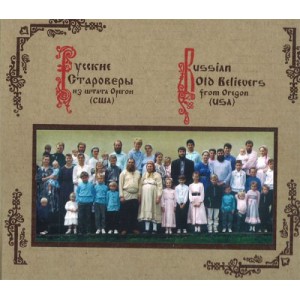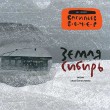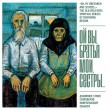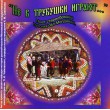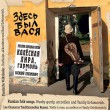- Russian old Believers from Oregon (USA) 2CD (2011)
Most of Old Believers who settled in Woodburn, Oregon in 1962 had come from Turkey. Their ancestors chose not to accept the 1656 church reforms of Patriarch Nikon and had to flee Russia, first appearing in the trans-Danube territories (present day Romania) at the end of the 17th - beginning of the 18th century, and later migrating to Turkey. This group call themselves Turchane (from Turkey). Another Old Believer group reached Woodburn by a more complicated route: from China via Hong-Kong and Brazil. Their ancestors were exiled to the banks of the Angara River to the east of Lake Baikal. In the 1920s, they fled to Northern China to escape the "Red plague." However, they had to take off again in 1949 when Mao came to power. This group call themselves Harbintsy (from Harbin).
When the Russian peasants arrived in Oregon, the state administration apportioned land, giving about 5-8 hectares for a family. They also provided interest-free loans, and freed newcomers from taxes for ten years. By the 1990s the Old Believers had paid off their debts and lived in prosperity as economic equals to the average American farmer. They cultivated berries - strawberries and blackberries - and Christmas trees, all crops that thrive in Oregon soil.
In the mid-1990s, the Russian Old Believer community of Woodburn numbered approximately five thousand persons. United by strict laws of faith and in spite of their different historical routes, both the 'Turkish and the 'Harbin' branches of Old Believers have preserved religious and everyday life as it was practiced in Old Russia, that is before the church schism of 1656.
Old Believers brought with them ancient icons, old-printed books, hand-written notebooks with texts of spiritual poetry, and samples of traditional garments. Until today the women of the community craft shirts skirts and dresses after the old models and embellish them with ancient embroidery patterns and hand-set о hand-knit belts. Women wear long hair and headgear in a traditional style. Men do not cut their hair and do no shave. In their prayer houses Old Believers sing the famous ancient chants noted with special signs called kryuki ('hooks'). They also gather in their homes in small groups to sing spiritual poetry while they are doing their handwork. When they do not fast, middle-aged Old Believers allow themselves to sing unreligious songs, which are considered 'devilish' by elder generation.
The stores of unreligious songs brought to the New World by Turchane and Harbintsy were different Turchane predominantly brought long and quiet songs, and Harbintsy mainly brought love lyrics which are usually sung in a style where the leader begins by singing in a high or low voice while the rest of the singers enter later with supporting voices. With years, the repertoires of the two groups have naturally blended into one.
A contemporary wedding ceremony of Old Believers is performed along the rules of the old Russia wedding rite. The entire phase before the wedding is accompanied by maiden songs, The wedding takes place in a prayer house or a church and is accompanied by wedding songs and spiritual poems. After the wedding ceremony, a festive meal is served at the groom's house where the guests reel and dance. The dancing goes to harmonica, the only musical instrument allowed to play in their culture. Harmonica was brought by the Old Believers to Oregon from Turkey.
Elena Razumovskaya, January 2011
Translated by Maria Razwnovskaj
1. Prevyshe uma, Rozhdestva i chudes Nevesta (stih)
2. Ezhe Krestom ograzhdaemi vragu protivlyaemsya (stih)
3. Vy, lyudi nauchennye
4. Slezy livshi o Sione (stih «Plach Izrailya»)
5. Komu povyom pechal' moyu (stih «Plach Iosifa»)
6. Zavist'yu gonima, ya polna styda (stih «Pro Agar'»)
7. V okeyan-more kamen' lezhit (stih «O Hristovom raspyatii»)
8. Spit Sion i dremlet zloba (stih «O Hristovom voskresenii»)
9. Vostochnaya derzhava slavnogo Kieva-grada (stih «O Borise i Glebe»)
10. Bytiyu, bytiyu, byt' i vecheru (stih «O Strashnom sude»)
11. Ya lezhu na odre (stih «Pro greshnika»)
12. Vremya unyloe nastalo (pokayannaya)
13. Vse lyudi zhivut, kak cvety cvetut (pokayannaya)
14. Presvetlyj angel moj Gospoden (molitva)
15. Svyatyj Bozhe, svyatyj Krepkij (molitva)
16. Poehal moj milen'kij v gorodochek
17. Ne letaj, golub', vysoko Devishnye pesni (do venchanija)
18. Iz-za lesu, lesu tyomnogo Devishnye pesni (do venchanija)
19. Kak iz-za Donu, Donu Tihogo Devishnye pesni (do venchanija)
20. Eh, sine more razygralosya Devishnye pesni (do venchanija)
21. Lezhat brus'ya da netyosanye Devishnye pesni (do venchanija)
22. Elice vo Hrista krestistisya Venchal'nye stihery
23. Radujsya, Carice! Venchal'nye stihery
24. Na vorotah dva sokolika sidyat
25. Chiyo zh eto zhito, vot zhito?
26. Kto zhe u nas holost, holost, nezhenatyj?
27. Sidit Dryoma
28. Kak povadilasya Dunya
29. Vanya pó dvoru hodit
30. Oi, mamen'ka, toshno mne
31. Zapisali kazachka v sluzhbu carskuyu
32. Na gore krutoj, vysokoj
33. Oi da hodit Masha
34. Posidi, Dunya, poglyadi, Dunya
35. Temnica temnaja
36. Prizamknuvshi chyornu dver' tyazhyolu
37. Nachinayutsya dni zolotyе
38. Po dikim pustynyam Kitaya


